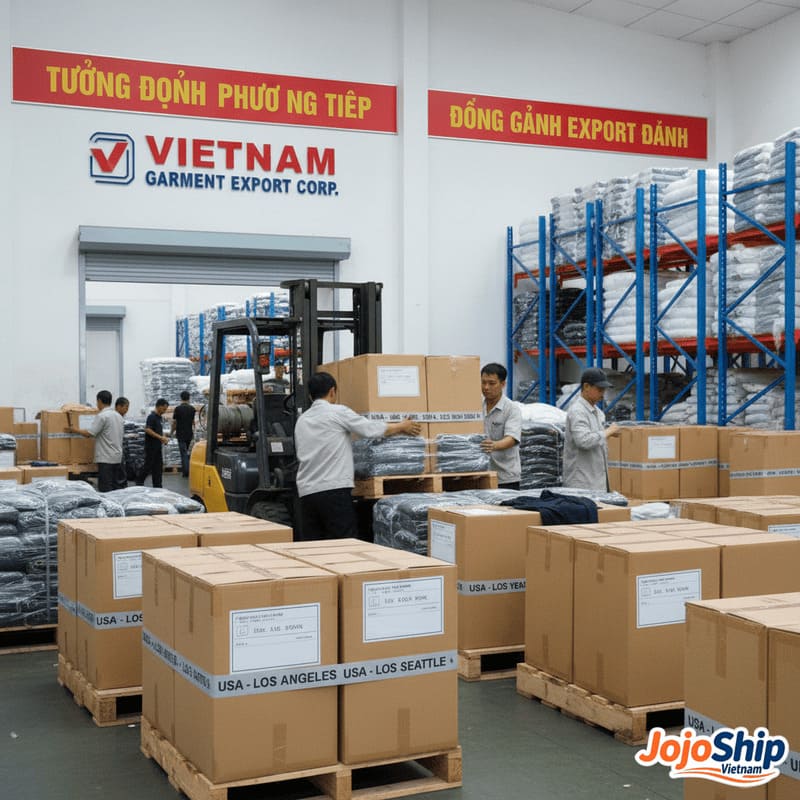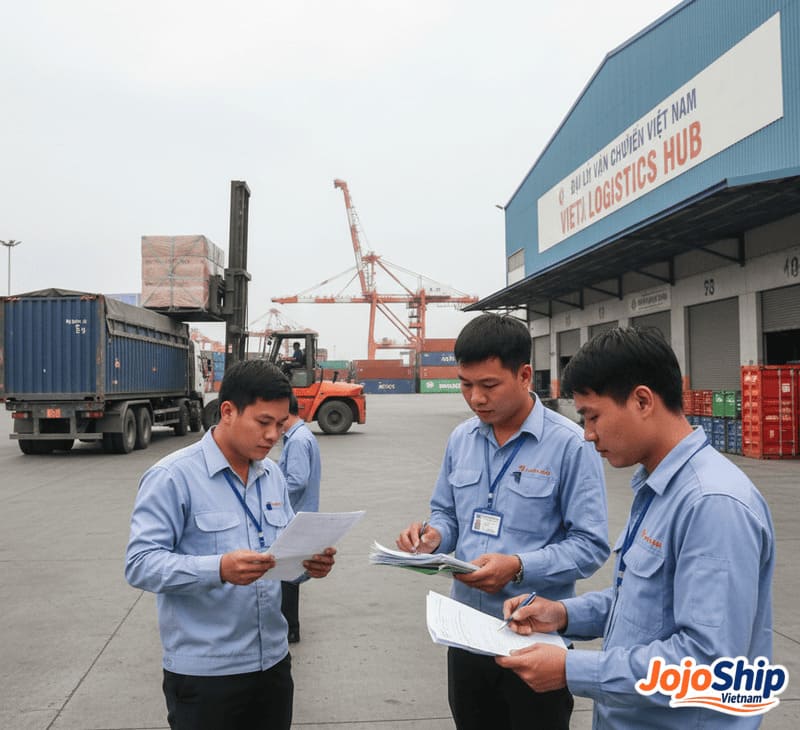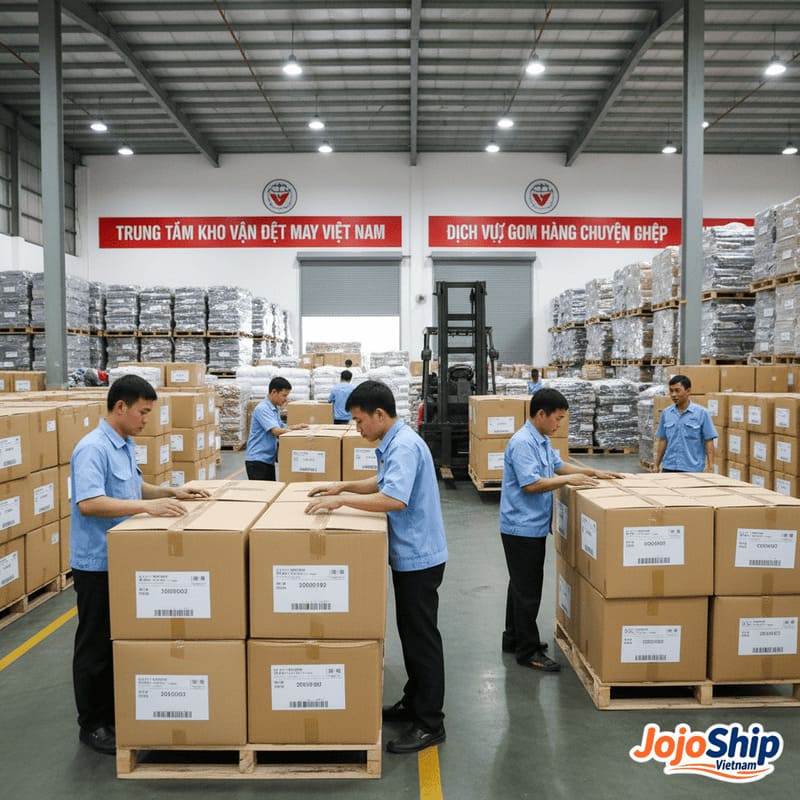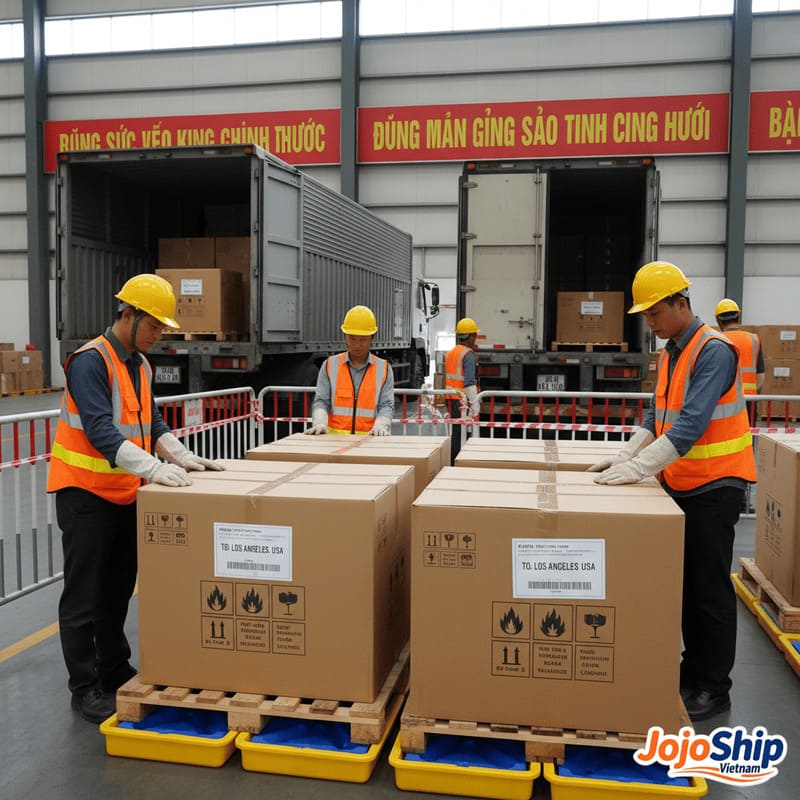Shipping textiles from Vietnam presents countless logistical hurdles—specialized packaging, customs documentation, and protecting delicate fabrics. Many businesses struggle with delayed shipments, damaged goods, and unexpected costs that eat into profit margins.
Freight forwarders in Vietnam provide comprehensive textile shipping services including ocean and air freight options, consolidation for cost savings, specialized garment packaging, customs documentation assistance, warehousing, real-time shipment tracking, insurance coverage, and compliance management for textile-specific regulations and certifications.

The textile industry forms a critical part of Vietnam's export economy, with unique shipping requirements that demand specialized expertise. Let's examine the specific services freight forwarders provide for textile exporters and how these services address the particular challenges of this industry.
What services do Vietnam freight forwarders offer?
Navigating Vietnam's complex export landscape alone leads to costly mistakes and shipment delays. Without expert guidance, you'll face paperwork nightmares, confusing regulations, and unpredictable shipping costs.
Vietnam freight forwarders offer comprehensive logistics services including international shipping via sea, air, and multimodal transport, customs brokerage, cargo consolidation, warehousing, packaging, insurance, tracking systems, and documentation management for imports and exports across all major global trade routes.

Vietnam's freight forwarding industry has evolved significantly in recent years to support the country's growing export economy. These companies provide end-to-end logistics solutions that extend far beyond simple transportation arrangements.
Core Freight Forwarding Services in Vietnam
The range of services offered by Vietnamese freight forwarders varies widely, but most established companies provide several fundamental services. I've worked with dozens of textile exporters who rely on these core offerings to streamline their international shipping operations.
Transportation Services
| Service Type | Description | Benefits for Textile Shipments |
|---|---|---|
| Ocean Freight (FCL) | Full container shipping for large orders | Cost-effective for bulk fabric or large garment orders |
| Ocean Freight (LCL) | Less-than-container load for smaller shipments | Economical for smaller textile batches or samples |
| Air Freight | Express shipping via cargo planes | Ideal for time-sensitive fashion items and seasonal collections |
| Sea-Air Combinations | Hybrid solution using both transport modes | Balances cost and speed for medium-urgency textile orders |
| Inland Transportation | Trucking between factories, ports and warehouses | Ensures seamless movement from production to export points |
Many of our textile clients use different transportation methods depending on their specific needs. One garment manufacturer I work with ships their regular orders via ocean freight but uses air freight for their high-fashion items that need to reach markets quickly.
Specialized Textile Handling
Textiles require particular attention during the shipping process. Vietnam freight forwarders1 have developed expertise in:
- Garment-on-Hanger (GOH) Services2: Special containers with hanging rails to transport finished garments wrinkle-free
- Climate-Controlled Transport: Protecting delicate fabrics from humidity and temperature fluctuations
- Anti-mold Packaging: Using silica gel packs and moisture barriers to prevent mold growth during transit
- Fumigation Services: Meeting destination country requirements for pest control
- Custom Crating and Packaging: Designing protective packaging for delicate or high-value textile items
I recently helped a silk exporter implement specialized packaging solutions that virtually eliminated the moisture damage they'd been experiencing during monsoon season shipments.
Documentation and Compliance
Vietnam freight forwarders1 manage the complex paperwork associated with textile exports:
- Certificate of Origin documentation
- Textile-specific customs classifications and HS codes
- Import quota management for restricted markets
- Compliance with destination country textile labeling requirements
- Fumigation certificates and other phytosanitary documentation
These documentation services are particularly valuable for small and medium-sized textile exporters who may not have in-house expertise in international shipping regulations.
Who offers consolidated shipping options for small businesses exporting from Vietnam?
Small textile businesses face prohibitive shipping costs3 when they can't fill entire containers. This forces many to delay shipments until they have enough volume, causing missed deadlines and frustrated customers.
Several freight forwarders offer consolidated shipping from Vietnam for small businesses, including JojoShip Vietnam, FNM Vietnam, Etrans, Logivan, and international companies with local offices like DHL and DB Schenker. These providers combine multiple small shipments into single containers to reduce costs.

Consolidated shipping services have become increasingly sophisticated in Vietnam, offering small textile exporters4 access to global markets at reasonable costs. These services work by combining multiple smaller shipments into full containers.
Consolidation Services for Textile Exporters
Consolidation shipping (also called Less than Container Load5 or LCL) offers significant advantages for small textile businesses. Based on my experience working with emerging fashion brands, here's how these services typically operate in Vietnam:
The Consolidation Process
| Stage | Description | Timeline |
|---|---|---|
| Booking | Exporter reserves space in a consolidated container | 5-7 days before pickup |
| Collection | Freight forwarder collects goods from factory or warehouse | 3-5 days before departure |
| Consolidation | Shipments from multiple exporters are combined at a warehouse | 2-3 days before departure |
| Documentation | Forwarder prepares export papers and manifests | 1-2 days before departure |
| Loading | Consolidated shipment is loaded into container | 1 day before departure |
| Shipping | Container departs on scheduled vessel | Sailing day |
| Deconsolidation | Shipments are separated at destination port | 2-3 days after arrival |
| Final Delivery | Individual shipments reach their final destinations | 3-7 days after arrival |
I've helped many textile startups utilize consolidation services to test international markets before committing to full container shipments. One accessory designer started with just 2 cubic meters of product in a consolidated shipment and gradually scaled to full container loads as their business grew.
Special Considerations for Textile Consolidation
Textile products require specific handling during the consolidation process:
- Product Protection: Reputable consolidators use dividers and securing methods to prevent different textile products from damaging each other
- Labeling Requirements: Clear package labeling to ensure proper handling and deconsolidation
- Scheduling Flexibility: Better consolidators offer multiple weekly departures to major destinations
- Origin Verification: Maintaining proper documentation to confirm Vietnamese origin for customs purposes
When I work with clients on consolidated shipments, I always recommend selecting forwarders with dedicated textile expertise. A general consolidator may not understand that silk fabrics can't be placed near products with strong odors, or that certain dyes may transfer under pressure.
Value-Added Consolidation Services
The most competitive consolidation providers in Vietnam offer additional services:
- Pre-shipment inspection at consolidation warehouses
- Pick-and-pack services for multi-SKU textile orders
- Re-labeling and basic alterations
- Inventory management across multiple shipments
- Integration with e-commerce platforms for direct-to-consumer fulfillment
These extra services can be particularly valuable for fashion startups and small textile exporters4 with limited infrastructure.
Where can I find freight forwarders that handle hazardous materials from Vietnam?
Shipping textiles with treatments, dyes, or finishes classified as hazardous creates regulatory nightmares. Without specialized handling, these shipments face rejection at ports, lengthy delays, hefty fines, and potential product seizures.
Specialized freight forwarders handling hazardous materials from Vietnam include DHL Global Forwarding, Kuehne+Nagel Vietnam, DB Schenker Vietnam, and JojoShip Vietnam. These companies have HAZMAT certification, trained personnel, and experience managing dangerous goods documentation for textile chemicals, dyes, and treated fabrics.

While most people don't immediately associate textiles with hazardous materials, certain chemicals used in fabric treatment and dyeing processes can fall under hazardous goods regulations. Finding forwarders equipped to handle these shipments requires understanding the specific compliance requirements.
Hazardous Materials in Textile Shipping
The textile industry uses various chemicals and treatments that may be classified as hazardous for shipping purposes. Based on my experience coordinating hazardous textile shipments, here are the most common scenarios requiring specialized handling:
Common Hazardous Materials in Textile Shipping
| Material Type | Hazard Classification | Common in... |
|---|---|---|
| Fabric Dyes | Class 3 (Flammable Liquids) | Textile manufacturing supplies |
| Finishing Chemicals | Class 8 (Corrosives) | Raw material shipments |
| Waterproofing Treatments | Class 9 (Miscellaneous Hazards) | Outdoor and technical fabrics |
| Formaldehyde Resins | Class 6.1 (Toxic Substances) | Wrinkle-resistant textiles |
| Metal Accessories | Class 4.1 (Flammable Solids) | Fashion components |
I once helped a technical textile manufacturer navigate the complex requirements for shipping their specialized waterproof fabrics. The water-resistant chemicals used in their process required hazardous materials documentation that their regular forwarder couldn't provide.
Evaluating Hazardous Material Handling Capabilities
When searching for a freight forwarder to handle potentially hazardous textile shipments, several qualifications are essential:
- IATA DGR Certification6: For air shipments of dangerous goods
- IMDG Training7: For ocean freight of hazardous materials
- Local Certifications: Vietnamese-specific hazardous handling permits
- Specialized Insurance: Coverage specifically for hazardous cargo
- Emergency Response Plans8: Procedures for containing potential incidents
I always advise clients to directly ask potential forwarders about their experience with similar materials. A forwarder may be technically certified but have limited practical experience with textile-specific hazards.
Documentation Requirements for Hazardous Textile Shipments
Shipping hazardous textile materials requires extensive documentation, which qualified freight forwarders should manage:
- Dangerous Goods Declaration9
- Material Safety Data Sheets (MSDS)10
- Proper packaging certification
- Emergency contact information
- Detailed packing lists with hazard classifications
- Special permits for certain destinations
The best forwarders provide guidance on proper packaging, labeling, and segregation requirements before shipments are prepared. This proactive approach prevents costly delays and compliance issues.
Case Study: Managing Chemical Dye Shipments
One textile client needed to ship specialized dyes classified as Class 3 Dangerous Goods from Vietnam to their manufacturing facilities worldwide. We developed a standardized procedure with their freight forwarder that included:
- Pre-approved packaging meeting UN specifications
- Standardized documentation templates
- Regular training updates for shipping personnel
- Established relationships with carriers accepting such cargo
- Insurance coverage specifically for chemical transport
This systematic approach reduced their shipping delays by 87% and eliminated regulatory penalties they had previously faced with improperly documented shipments.
When selecting a forwarder for hazardous textile materials, I recommend prioritizing experience over price. The cheapest option often becomes the most expensive when shipments are rejected or delayed due to compliance issues.
Conclusion
Freight forwarders provide essential services for textile exporters from Vietnam, including specialized packaging, consolidation options for small businesses, customs expertise, and hazardous materials handling. By partnering with the right logistics provider, textile businesses can navigate complex shipping challenges while maintaining product quality and meeting delivery deadlines.
-
Explore this link to understand the full range of logistics services offered by Vietnam freight forwarders. ↩ ↩
-
Explore GOH services to see how they can protect your garments during transit. ↩
-
Find effective strategies for small businesses to minimize shipping costs and improve profitability. ↩
-
Understand the unique challenges textile exporters encounter and how to overcome them for successful shipping. ↩ ↩
-
Learn about LCL shipping and how it can benefit small exporters by allowing them to share container space. ↩
-
Learn about IATA DGR Certification to ensure your freight forwarder meets international safety standards. ↩
-
IMDG Training is essential for safe ocean freight; discover its importance for your shipments. ↩
-
Emergency Response Plans are critical for safety; find out what they should entail for effective handling. ↩
-
A Dangerous Goods Declaration is essential for compliance; learn why it matters in hazardous shipping. ↩
-
MSDS are vital for understanding the risks of hazardous materials; explore their significance in shipping. ↩




